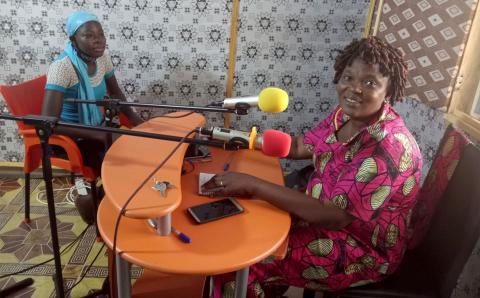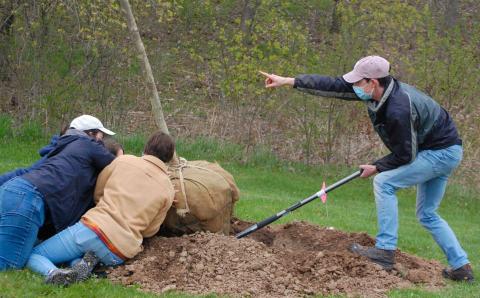The president of the Christian Reformed Church in Cuba recently visited several Christian Reformed congregations in the United States to share how the church has been able to not just survive, but grow in challenging circumstances.
Pastor Yordanys Diaz visited congregations in Michigan and Minnesota during his visit. He also visited the CRC’s North American headquarters in Grand Rapids, Mich., as well as Calvin University, Calvin Theological Seminary, and several Christian schools in the Grand Rapids area.
Diaz oversees 35 congregations scattered around the island nation, with a total of about 1,500 members. He said the church is connected to about 3,000 people overall throughout the country.
In addition to trying to build up the church in a country that has not been friendly to Christianity, Diaz has faced the additional challenge of trying to serve churches and their members in the wake of the COVID-19 pandemic. But he and the pastors that serve those congregations have found ways to connect with the people they serve.
“The church work goes beyond our doors,” Diaz said during a Sept. 22 talk at Hillside Christian Reformed Church in Kentwood, Mich., speaking in Spanish with English interpretation.
Diaz became the president of the CRC in Cuba two years ago, and almost immediately the church and its members faced serious challenges.
“There was a huge lack of everything. Food and supplies disappeared, and on top of that, they welcomed COVID,” he said. “The big challenge was how to be the Christian Reformed Church in Cuba in the middle of everything that was going on.”
Churches were shut down for in-person worship by the government during the pandemic and only recently were allowed to reopen. But they persevered even though they were not able to meet in person.
“They developed a human network. So they will print up a bulletin with readings, with liturgy. They print it out and send it to the churches, and then between pastors and leaders every week, they go to each home and they bring that bulletin (to the people). That’s how they keep working as a church.”
“Even in older houses where they brought the bulletin, members (would say) ‘Don’t forget my tithes and offerings.’ They went to the beginnings of the primitive church—churches in the house.”
As a result of the outreach to its members, neighbors of church members also started asking for copies of the weekly bulletins, Diaz said.
“We think because of that, a lot of people (started) coming to the churches when they reopened,” he said.
The denomination in Cuba also has been able, with the help of offerings from churches in the U.S., to purchase food and medical supplies to bring back to serve people in need.
The CRC has had a longstanding relationship with the church in Cuba, dating back to the initial efforts of LaGrave Avenue CRC in Grand Rapids and its Henry Beets Mission Society. LaGrave Avenue sent its first missionary to Cuba, Clarence Nyenhuis, in 1958.
Not long after came the revolution that swept Fidel Castro into power, and for several decades, contact between the CRC in North America and the Cuban church was very limited. But in recent years, the government has allowed contact with the Cuban churches, and LaGrave Avenue has reestablished ties with the CRC in Cuba, sending pastors and lay people to build and repair churches, build parsonages for pastors, and support educational programs.
“The Christian Reformed Church in Cuba, in every area, is being marked and influenced by the prayers, by the encouragement, and by the offerings of the church here in North America,” Diaz said.
Hillside CRC is hoping to be able to send a team to Cuba next year, depending on circumstances in that country, said Winabelle Gritter, a Hillside member and retired CRC missionary who served in Mexico and Latin America.
Even in the challenges he faces, Diaz remains steadfast and positive about the future of the CRC in Cuba. He will continue to advocate for increased religious freedom for the Cuban people.
“God has shown us that nothing against the church will prevail,” he said. “That’s one of the biggest challenges right now, to keep going as a church, for the glory of God.”
About the Author
Greg Chandler is a freelance news correspondent for The Banner. He lives in Grand Rapids, Michigan.






